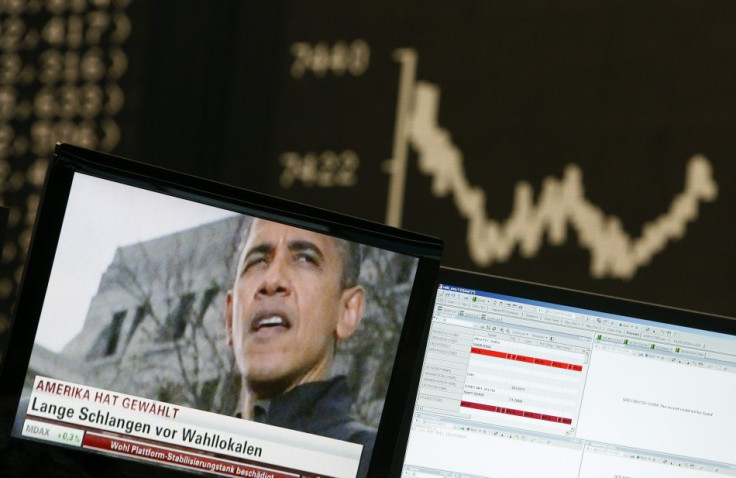Global Stocks Slump As US Election Optimism Gives Way to Economic Reality

Stock markets in Europe and the US fell hard Wednesday after the European Union issued a bleak outlook for its beleaguered economy and American investors switched focus from the decisive landslide victory for President Barack Obama to the impending fiscal cliff that could turn the world's biggest economy back into recession.
The Eurozone is unlikely to show significant strength until at least 2014, the European Union said during its semi-annual budget and GDP forecasts, which predicted slower growth in all seventeen of the single currency economies. Perhaps even more troubling was its assessment for both Germany - where it expects flat growth of 0.8 percent, half is previous estimate, for the next two years - and Spain, where is sees bigger-than-expected budget deficits and a recession that stretches into 2014.
"The weak overall economic situation, combined with slow money growth, means that the risks of inflation are currently very low over the medium term," European Central Bank President Mario Draghi told an audience in Frankfurt. "Germany has so far been largely insulated from some of the difficulties elsewhere in the euro area. The latest data suggest that these developments are now starting to affect the German economy."
European stocks fell heavily on the news, although there was weakness across the markets after industrial production from Europe's biggest economy plunged by 1.8 percent in September, nearly four times more than analysts' had forecast, and the country's economy minister warned the weak orders and slow growth would persist throughout the fourth quarter of this year.
Germany's benchmark DAX index - one of the best global performers of the year - fell 1.4 percent by the end of the trading day, with similar percentage declines in France, Spain and Italy. Britain's FTSE 100 was slightly firmer but still gave back early gains to near the end of the session with a 1.7 percent loss.
The EU forecast could have huge implications for Spain and its much-anticipated request for formal financial assistance from its EU partners. EU Economic and Monetary Affairs Commissioner Ollie Rehn said the European Union would act if Spain made the request, but noted that no move for such aid had been made by Madrid.
Prime Minister Mariano Rajoy may decide to wait until the results of state elections in Catalonia, the nation's richest and most populous region, later this month, when independence hungry Catalans may deliver President Artur Mas a mandate for secession from Madrid.
Further complications for the region's debt crisis could come later today from Greece, where lawmakers are debating an extremely divisive austerity package needed to release the next critical round of funding from its international lenders and avoid the collapse of its months-old government.
Prime Minister Antonis Samaras is trying to win support for the controversial €13.5bn package of budget cuts, tax increases and labour market reforms through a hostile parliament despite widespread outrage over yet another round of austerity for recession-weary Greeks and a sizeable rebellion within his shaky coalition government.
The passage should pave the way for a long-delayed tranche of around €31.5bn from Greece's so-called Trokia of lenders, which includes the European Union, the International Monetary Fund and the ECB. Rehn told reporters in Brussels Wednesday that any extension of terms to Greece's €240bn bailout will hinge on the parliamentary vote.
In the US, early indications of a solid opening tone to trading on the back of President Obama's clear Electoral College victory last night were snuffed out by both the gloomy European news and the results of elections for the US House of Representatives, where Republicans held onto control of Congress and Democrats strengthened their grip on the Senate.
Last year's debt-ceiling debates gave way to an 11<sup>th hour agreement between feuding Democratic and Republican lawmakers that resulted - despite months of extended negotiations - in partisan political gridlock.
The brokered compromise at the time, now known as the "fiscal cliff", represents an automatic series of fiscal measures that will activate (with the aim of reducing the nation's over $16tn debt load) on 1 January 2013.
The $620bn programme could, according to various analysts, slow US's fragile economic recovery by at least 1.3 percentage points to as much as 2 percentage points. In the most aggressive case, it could also return the economy to recession.
The figures are significant given the fact that American job growth has been disappointingly slow (President Barack Obama's four-year term has seen the net creation of only 194,000 new jobs, the lowest total in four decades) and the economic recovery is beginning to wobble (the last two quarters of GDP growth have been the slowest since 2009).
Fitch Ratings said in a report issued Wednesday that an unchecked fiscal cliff "would tip the US economy into an unnecessary and avoidable recession and result in an increase in the unemployment rate to above 10 percent in 2013"
It also added that while it does not expect a breach of the debt ceiling, its risk is still significant: "On current projections, the Treasury Secretary will likely have to implement extraordinary measures by year-end to maintain borrowing capacity under the current debt ceiling of $16.394trn. Failure yet again to reach agreement on raising the debt ceiling in a timely manner would undermine confidence in the United States as a reliable borrower and thus its 'AAA' status, prompting a formal review of the US sovereign rating."
The Dow Jones Industrial Average fell more than 200 points in the early portion of trading on Wall Street before stabilizing with a 1.25 percent decline that put the benchmark at 13,080.43. The broader S&P 500 fell more than 1.2 percent to trade at 1,410.2.
The US dollar rose to a two-month high against a basket of major currencies.
© Copyright IBTimes 2025. All rights reserved.





















